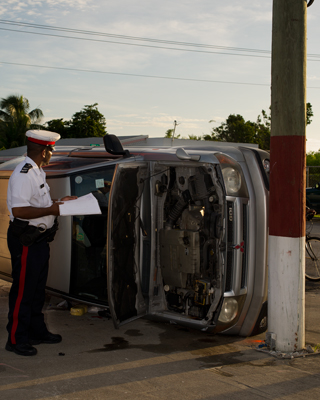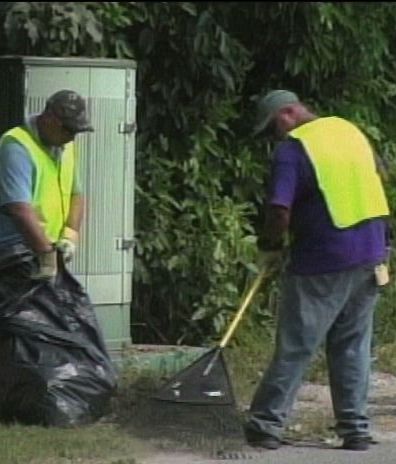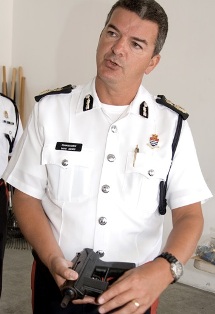Archive for December, 2011

Ozzie acquitted in cow cod assault case
 (CNS): After more than 14 months of waiting for the outcome of the charges laid against him, former MLA Osbourne Bodden expressed enormous relief on Tuesday morning as he was acquitted of beating a man with a cow cod. The Bodden Town business man had always denied using a five foot long bull’s penis, as claimed by Kirk Watler. He had, however, admitted hitting him with a stick in self defence during an altercation at Lorna’s Texaco, the gas station owned by Bodden, in October 2010. Magistrate Nova Hall found Bodden not guilty of assualt as she said there were far too many inconsistencies in the evidence given by Watler.
(CNS): After more than 14 months of waiting for the outcome of the charges laid against him, former MLA Osbourne Bodden expressed enormous relief on Tuesday morning as he was acquitted of beating a man with a cow cod. The Bodden Town business man had always denied using a five foot long bull’s penis, as claimed by Kirk Watler. He had, however, admitted hitting him with a stick in self defence during an altercation at Lorna’s Texaco, the gas station owned by Bodden, in October 2010. Magistrate Nova Hall found Bodden not guilty of assualt as she said there were far too many inconsistencies in the evidence given by Watler.
Bodden said that although he was confident he would eventually be acquitted, the case had been a cloud hanging over him and his family. He said that the case should never have gone so far as it was just a case of self-defence.
Looking forward to the holidays and thanking God, he said, “This is such a relief for me and my family after such a stressful time. It’s a good Christmas present.”
During the trial the court heard how the fight between Bodden and Watler had occurred after Watler had caused a disturbance at the gas station’s liquor store.
On the day in question at around lunchtime, Bodden had given Watler a flask of rum and a packet of cigarettes for helping to unload a truck. Watler had shared the rum that afternoon with a group of friends who were also hanging around the public beach by the station, enjoying a drink or two. Sometime later on the same day after Bodden had left, Watler returned to the liquor store at Lorna’s with a flask of rum, which he insisted was a different bottle from that given to him by Bodden, asking to exchange the ‘rum’ for cash or beer.
The cashier told Watler she would need to contact Bodden to clear the exchange with him and he then became agitated, angry and upset and caused a scene in the store, insisting that she made the exchange without calling her boss, but when the police were called he left the premises.
Later that evening when Bodden returned, Watler was still on the beach drinking and witnesses said he was taunting Bodden about calling the police. A few minutes later a member of the staff who was working the pumps at the gas station saw both men engaged in a tussle across the street on the ground and he ran over to pull them apart. He did not see Bodden strike Watler but he saw that Bodden did have a stick and that Watler had two green beer bottles in his hands.
Watler claimed that during the altercation Bodden had struck him several times with a cow cod, described as being some 4 inches in diameter and around 4 to 5 feet long, but the witness did not see such a weapon.
During the trial the lawyers agreed that the credibility of the complainant, who had clearly been drinking on the day, was in question and the magistrate would have to consider if he was bolstering his case by manufacturing things.
Ferguson noted, however, that the injuries sustained by Watler were consistent with a weapon which was pliable rather than a stick. Lloyd Sampson, who was representing Bodden, asked the magistrate to consider the incredulous nature of the complainant’s evidence, whom he said had “lost the plot” in the shop on the day in question, which had been captured on the CCTV.

It must be Christmas
I noticed last night that there is the usual one lonely string of Christmas lights hanging forlornly from the utility poles in George Town. Is this the best we can do? What will our visitors think? What do our children think? Perhaps we need to look at what our competition is doing — we might learn a thing or two.
This initiative is so poor that it would be better not to put them up at all. If the organization behind these poor benighted lights cannot afford better then perhaps they could approach the merchant community and ask for a donation. Or they could ask the premier if he could spare a contribution from his, ah, 'delegated fund'.
We have claimed for years to be a tourist destination but it seems that we have no concept of how to do this. We cannot even get our act together to put pedestrian crossings on the West Bay Road to stop our visitors getting mown down by insane drivers. We have paid lip service for decades to the idea of, first of all, cruise ship moorings (remember the anchors from the Rapsody salvage?) and more lately a cruise ship pier, and we still don't have one.
If we are seriously catering to tourists then we need to make their experience as memorable as possible, and this is memorable in a positive way, not to have some of them return to their home country in a body cast!
Perhaps we should be trying to work on increasing our stayover tourism. A lengthened runway would allow us to bring in long haul flights from Asia or the Persian Gulf (many multi-millionaires). In fact, this might allow Cayman Airways to finally make a profit by becoming a regional hub for the Western Caribbean and Central America.
Have a wonderful, if rather drab, Holiday Season!

Rollover suspension comes as relief to tourism sector
 (CNS Business): Two months after the Legislative Assembly passed the two-year suspension of the term limit or “rollover” policy, reaction within members of the tourism industry is mixed, though employers expressed satisfaction that their staff on work permits facing their seven-year maximum can now stay longer. The Term Limit Extension Period enables employers to retain staff an additional two years, but questions about its efficacy and implementation remain. Steve Broadbelt, partner in dive operator Ocean Frontiers and a critic of the rollover policy, referred to the TLEP as a stopgap measure that will not ultimately deal with the issues surrounding the rollover policy and the eventual granting of permanent residency. Read more on CNS Business
(CNS Business): Two months after the Legislative Assembly passed the two-year suspension of the term limit or “rollover” policy, reaction within members of the tourism industry is mixed, though employers expressed satisfaction that their staff on work permits facing their seven-year maximum can now stay longer. The Term Limit Extension Period enables employers to retain staff an additional two years, but questions about its efficacy and implementation remain. Steve Broadbelt, partner in dive operator Ocean Frontiers and a critic of the rollover policy, referred to the TLEP as a stopgap measure that will not ultimately deal with the issues surrounding the rollover policy and the eventual granting of permanent residency. Read more on CNS Business

Stalker found guilty of rape
 (CNS): A man who systematically stalked, harassed, abused and sexually assaulted his former lover was found guilty of rape, assault and abduction by the chief justice Monday. Philip Rose was convictedof the crimes following a judge alone trial in which the court heard how he had emotionally and physically abused his victim over a two and half year period after she broke off their relationship. Rose had denied the offences, accusing his victim of being an abusive, jealous and controlling woman who had contrived the allegations against him after he had rejected her. However, as a result of telephone messages, texts and emails that his victim had kept over the period of abuse, along with other evidence, the judge took a different view.
(CNS): A man who systematically stalked, harassed, abused and sexually assaulted his former lover was found guilty of rape, assault and abduction by the chief justice Monday. Philip Rose was convictedof the crimes following a judge alone trial in which the court heard how he had emotionally and physically abused his victim over a two and half year period after she broke off their relationship. Rose had denied the offences, accusing his victim of being an abusive, jealous and controlling woman who had contrived the allegations against him after he had rejected her. However, as a result of telephone messages, texts and emails that his victim had kept over the period of abuse, along with other evidence, the judge took a different view.
Chief Justice Anthony Smellie presided over the trial of the George Town man in November when, over three days of evidence, the victim, a former executive of the Cayman Islands branch of a major bank, recounted a harrowing ordeal of abuse in which she became trapped through fear and embarrassment.
She described being stalked “every minute of the day”, with Rose being “always just 10 metres away” controlling her entire life through fear and intimidaiton. He followed her to and from work and whenever she went out; he repeatedly turned up and knocked on the window of her apartment; he constantly called and texted her cell phones and her office line, making abusive threats. He also physically assaulted her and raped her on some six occasions.
The victim had made some attempts to contact the police during her ordeal but had failed to follow through with the reports as a result of a number of what the judge described as complex issues and because of fear of her abuser.
She had, however, reported the rape and abuse to a local counsellor and had seen a doctor after two physically violent assaults that Rose had committed against her, long before she eventually transferred to Canada and filed her complaint against him.
As well as taking pictures of her injuries received at the hands of Rose, the victim had also saved a significant number of the phone messages, texts and emails that Rose had made and sent to her from when the abuse and stalking first started after she broke up with him to when she had moved to Toronto.
It was these messages that the judge said painted a very different scenario from the one claimed by the defendant that he was the victim of a jealous, scorned woman’s false allegations. The telephone messages were exceptionally abusive and aggressive, littered with expletives and profanities as well as frightening threats. The judge said the messages were threatening and violent and illustrative of the state of mind of the defendant.
In his verdict, in which he found Rose guilty of six counts of rape, two of assault causing actual bodily harm and one of abduction, the judge said that despite some behaviour on the part of the victim that may seem hard to understand, he was satisfied she was telling the truth about her ordeal and in particular the specific counts on the indictment.
He said the aggressive and abusive telephone messages revealed an “obsessive, controlling and arrogant man who refused to accept he had been rejected.” The nature of the messages made it clear that they were not empty threats, as claimed by the defendant, but evidence of the abuse.
The judge found that the victim had not contrived the allegations after the event, in part because he said the messages began at the point when the victim claimed she had ended the relationship.
The victim had admitted to having a consensual affair with Rose when she was going through a difficult period in her own marriage. She had met him in a West Bay Road bar in 2006, where she had given him her number, and soon after they developed a largely sexual relationship that lasted for around five months before she discovered that Rose, who was also married and claiming to be going through a divorce, had many other lovers.
She told the court that on the day the victim broke off the relationship he changed and become aggressive, abusive and threatening. He told her thatshe belonged to him and he would never let her go.
For more than two years he was true to that threat and it was not until he abducted her and kept her captive in her own home for more than two days abusing, assaulting and raping her whilst she suffered from a concussion that she finally confided in her boss at the bank and systematically began to plan her escape and formally reported the crimes to the police.
The judge noted that the victim’s trust in the police had been undermined at the very start as she said a complaint she filed was lost. Later, with what he described as "the lackadaisical" efforts by the Family Support Unit, the records of her complaints there were also lost. The victim was put off too by the dismissive manner in which she claimed she was treated when she had first approached the police to make a report.
The victim finally broke through her silence, which was caused by a combination of fear for her safety, fear over losing her career, of him interfering with her immigration status, public exposure and embarrassment, as well of a feeling that she had caused the problem. Fearing that he really would kill her the next time, she revealed her ordeal.
When she made her escape to Canada, the messages from Rose were even more aggressive and threatening, despite claiming that he was the one who had by that time broken off what he claimed to be a continuously consensual relationship. When he finally realised that she was following through with the report and revealing her ordeal to the authorities, Rose left the Cayman Island for Panama where he was arrested in February of this year.
During the trial the victim admitted going along with Rose on occasions when he demanded and letting him into her apartment, where she had given reluctant consent to sex as she said sometimes it was just easier to give in because of the relentless harassment and a way to gain some piece of mind.
“I was embarrassed and I was scared and I did not know where to turn,” the victim had revealed in her evidence, adding that she really believed Rose’s threats that he would kill her or her husband.
In his verdict, which took three hours to deliver, the judge noted that consent when given as a result of force fear and intimidation was not consent.
Prior to the trial Rose had pleaded guilty to one of the counts against him, which was for abusing the complainant via an IT network in connection with the texts, emails and phone messages he sent.

Shredding public documents a crime, says ICO
 (CNS): In the wake of a recent decision by the information commissioner ordering the port authority to release documents relating to the GLF negotiations, the information commissioner’s office (ICO) has noted that under the Freedom of Information Law it is a crime to alter or destroy a public record in an effort to stop its disclosure. Following a number of comments on CNS by people worried that public authorities could be inclined to destroy information when forced to disclose things of a sensitive nature, the deputy commissioner said that during an appeal or hearing the relevant records are made available to the ICO so there should not be any discrepancies in what is ultimately disclosed to an applicant.
(CNS): In the wake of a recent decision by the information commissioner ordering the port authority to release documents relating to the GLF negotiations, the information commissioner’s office (ICO) has noted that under the Freedom of Information Law it is a crime to alter or destroy a public record in an effort to stop its disclosure. Following a number of comments on CNS by people worried that public authorities could be inclined to destroy information when forced to disclose things of a sensitive nature, the deputy commissioner said that during an appeal or hearing the relevant records are made available to the ICO so there should not be any discrepancies in what is ultimately disclosed to an applicant.
“The one aspect of FOI that actually constitutes a criminal offence is where someone alters or defaces, blocks or erases, destroys or conceals a record with the intention of preventing its disclosure (section 55 of the FOI Law)," Jan Liebaers explained.
"As well, the unauthorized destruction of government records is also an offence under the National Archive and Public Records Law 2007 (section 11 of the NAPR Law). Under both of these provisions an offence is punishable by fine or imprisonment. So far, neither of these two provisions has been used.
“These offences should not be confused with the normal process under the FOI Law, where a public authority may withhold access to records based on a claim that certain lawful exemptions apply, andthe Commissioner may decide whether she agrees or not upon appeal,” he added.
The FOI requests that are making the news headlines are mostly those that have been refused and have involved the ICO and eventually resulted in a hearing. But information managers are disclosing information in half of all requests and increasingly making more and more information available as the implementation of the law slowly begins to influence the previous culture of secrecy in government.
According to the ICO’s latest statistics, 50 percent of cases result in full (37%) or partial (13%) disclosure.
“The vast majority of FOI requests are resolved without any action or input from the ICO,” Liebaers said. “An increasing amount of government information gets released on a routine basis, without use of the FOI Law. Whether this is sufficient can be debated, but the overall positive influence of FOI cannot be denied, and neither can the hard work of many FOI Information Managers in the various public authorities.”
Information Commissioner Jennifer Dilbert has now ruled on 19 different cases where she has in ordered full disclosure, partial disclosure or has found that the authority had applied the law incorrectly by not revealing the information requested.
When the commissioner makes a decision that a public authority must disclose information, Liebaers explained, it is not her office that releases the documents. “At no time does the ICO itself release responsive records,” he said. “Disclosure is always undertaken by the public authority whose records they are, whether before or after an appeal to the ICO. This is in order to avoid any confusion, and to protect the ICO.”
When an authority is ordered to release a document by Dilbert it has, under the law, 45 days to reveal the documents in question. This is to ensure that either party has sufficient time to file an appeal with the Grand Court by means of a judicial review on the commissioner’s decision if they believe she is wrong but there is nothing to keep a public authority from releasing records before this period is up, which Liebaers says has been the case in most of the appeals so far.
As yet, no decision of the commissioner has made it to the courtroom. Although the Department of Agriculture went as far as filing an appeal with the courts over the commissioner’s order that they release the Alliance of Marine Mammal Parks and Aquarium Standards and Guidelines, which had been used to create the country’s own standards for managing captive dolphins, the authority withdrew the application to the courts and eventually released the document to the applicant.
The ICO discovered Monday that there is a problem with the email address for appeals (appeals@ico.gov.ky) which is being fixed, but in the meantime the office can be reached at info@infocomm.ky
Visit the IFO website for more information and to see all of the commissioner’s decisions and reports www.infocomm.ky.

Loss of license could cause long term struggles
 (CNS): Dozens of drink drivers have now been arrested since the start of Operation Christmas Cracker, police reported Monday. Twenty-eight people who have been caught since the police seasonal campaign began now face the loss of their driving licences, hefty fines and other serious implications because they were caught drinking and driving. The RCIPS is currently embarked on an aggressive campaign to change attitudes towards drinking and driving. Encouraging people to think about the long term impact of the crime, Inspector Adrian Barnett warned drivers that losing their licence may only be the start of significant economic loss. (Photo Dennie Warren Jr)
(CNS): Dozens of drink drivers have now been arrested since the start of Operation Christmas Cracker, police reported Monday. Twenty-eight people who have been caught since the police seasonal campaign began now face the loss of their driving licences, hefty fines and other serious implications because they were caught drinking and driving. The RCIPS is currently embarked on an aggressive campaign to change attitudes towards drinking and driving. Encouraging people to think about the long term impact of the crime, Inspector Adrian Barnett warned drivers that losing their licence may only be the start of significant economic loss. (Photo Dennie Warren Jr)
“A conviction for drink driving could cost you much more than losing your licence or a fine,” he said. “If you have to drive as part of your job, you may end up losing that job, being unable to pay bills and ultimately you may not be able to pay your mortgage to keep a roof over the head of your family. So, if the thought of injuring or killing yourself or someone else is not enough to stop you from getting behind the wheel, think of the long term financial impact your actions could have on your loved ones.
“The RCIPS will continue to aggressively target drink drivers over the coming weeks. Road blocks and random stop checks will be commonplace. So, don’t gamble with your life or your financial security. If you plan to drink, designate a driver or take a taxi,” he added.
Police revealed that one of the drink drivers arrested at the weekend was trapped inside his blazing car in theearly hours of Saturday morning after it crashed into a light pole in Cayman Brac in the early hours of Saturday morning.
The driver was freed after emergency services smashed the windscreen. He was taken to the Faith Hospital, where it was found he was not seriously injured. He was arrested on suspicion of DUI and dangerous driving.
Anyone who wishes to pass information to the police about drink drivers should contact their nearest police station.

New London bus runs out of fuel on M1
 (BBC): The new prototype London Routemaster bus ran out of fuel on a motorway, just days after being formally unveiled. The New Bus for London had to pull over on Monday after warning lights came on. The bus, which runs on a hybrid diesel-electric motor, was not refuelled before being driven from London to Millbrook Testing Ground, Bedfordshire. Transport for London (TfL) said the bus recharged its battery using energy from its brakes, but on long journeys had to run on diesel.
(BBC): The new prototype London Routemaster bus ran out of fuel on a motorway, just days after being formally unveiled. The New Bus for London had to pull over on Monday after warning lights came on. The bus, which runs on a hybrid diesel-electric motor, was not refuelled before being driven from London to Millbrook Testing Ground, Bedfordshire. Transport for London (TfL) said the bus recharged its battery using energy from its brakes, but on long journeys had to run on diesel.
The prototype bus was unveiled by London Mayor Boris Johnson on Friday and is undergoing testing in the capital.
The bus is designed for stop-start driving, which enables the battery to be recharged automatically," a TfL spokesman said. "However when the bus undertakes long, non-stopping motorway journeys, such as its journey to Bedfordshire this morning, it can lose charge and the driver is briefed to pull to the side of the road to allow the battery to recharge.
"After the battery had re-charged the driver was unable to re-start the engine."It was later established that the bus had run out of diesel. "Once the bus was refuelled it carried on its journey. We will be speaking with the operator to ensure that this does not happen again."
TfL claims the new bus will be the most environmentally friendly vehicle of its kind once it enters service. Eight of them will come into service in 2012.

Government misses pay-day for clean-up workers
 (CNS): At the end of last week’s roadside cleanup, many workers on the Christmas job scheme were left empty handed when government failed to make the pay-day. Police were called out in George Town on Friday evening after many of the temporary workers who had been given ten days work on the project turned up at the bank for their pay only to discover there was no cash for their labours. Cayman27 caught the disappointed and increasingly angry large group of workers and police on film. The workers were due to be paid on at 3pm on Friday afternoon but for at least the second time there were problems with government meeting the pay day.
(CNS): At the end of last week’s roadside cleanup, many workers on the Christmas job scheme were left empty handed when government failed to make the pay-day. Police were called out in George Town on Friday evening after many of the temporary workers who had been given ten days work on the project turned up at the bank for their pay only to discover there was no cash for their labours. Cayman27 caught the disappointed and increasingly angry large group of workers and police on film. The workers were due to be paid on at 3pm on Friday afternoon but for at least the second time there were problems with government meeting the pay day.
According to government, the Christmas roadside cleanup is designed not only to spruce up the islands for the festive season but also to give local unemployed workers a chance to earn some cash for the holiday, especially given the recent tough times. Around 800 workers have been given only ten days work this year on the project, which was first funded by the UDP administration in 2009 to the tune of more than $1million.

Illegal guns linked to crimes
 (CNS): The RCIPS has linked a number of illegally imported guns to suspects, crimes and smugglers through a combination of cooperation with US officials and local detective work that may help to secure convictions in some serious forthcoming cases. Police Commissioner David Baines said that the recent arrest in the US of a Caymanian man who had been acquitted by the appeal court of a murder charge and released from prison last month was part of a long term investigation tracking weapons originally purchased and smuggled to Cayman from Florida that started some three years ago. Police have since seized a number of these guns, including one that has been linked to three suspects and five different crimes. (Photo Dennie Warren Jr)
(CNS): The RCIPS has linked a number of illegally imported guns to suspects, crimes and smugglers through a combination of cooperation with US officials and local detective work that may help to secure convictions in some serious forthcoming cases. Police Commissioner David Baines said that the recent arrest in the US of a Caymanian man who had been acquitted by the appeal court of a murder charge and released from prison last month was part of a long term investigation tracking weapons originally purchased and smuggled to Cayman from Florida that started some three years ago. Police have since seized a number of these guns, including one that has been linked to three suspects and five different crimes. (Photo Dennie Warren Jr)
As the local police continue the investigations into the gun smuggling ring and seize weapons in other operations locally, they have been able to directly link a number of the guns to specific crimes and suspects, assisting with ongoing court cases as well as investigations into the more recent spate of fatal gang shootings in September.
Over the last few years customs officials and police in Cayman have intercepted at least three shipments of firearms that the Florida based ring of smugglers sent to Cayman, including weapons found in air conditioning units, a toy car and the refrigerator case, which led to the latest arrest of Brandon Leslie (aka Mykkle Ebanks) in the US.
Baines said that the RCIPS was aware of other weapons purchased and smuggled by the people involved in this ring and cooperation between the US agencies and the RCIPS in this case had been important. He said there could have been as many as seventeen guns getting through packaged in containers among appliances and other goods but the police had already recovered several of them, which would be revealed in forthcoming cases, and they were confident of seizing more.
Earlier this month Robert Terry received a twelve year sentence for possession of one of the weapons that was smuggled in by the ring and more recently another of the guns has been linked to five different crimes.
The senior officer explained that in the wider pursuit of those individuals responsible for the gun smuggling between America and Cayman local police have worked in conjunction with the Alcohol, Tobacco and Firearms (ATF) agency to use information to identify where the best location to prosecute would be. He noted that when Leslie was successfully prosecuted here for murder and serving a life sentence the cooperation between the law enforcement agencies switched to other priorities.
However, following his release on appeal, the RCIPS informed the US authorities that he was returning to Florida, enabling agents from the ATF to reactivate the existing warrant based on evidence that had been collected in the States.
“Our relationship with the United States in the fight against firearms smuggling is crucial,” Baines told CNS. He explained that it went beyond this particular smuggling ring to sharing intelligence on the trends in the region of how weapons and drugs are being moved around and how all Caribbean law enforcement agencies can best use their resources to tackle what is becoming a serious problem.
He added that the RCIPS has a fast track access to the ATF data-bases and can trace where weapons seized in Cayman originated and in some case where they were purchased and by whom.
The recent boost to police resources, following the decision by the Legislative Assembly to reinstate the RCIPS budget, would allow the police to focus even more on border control and gun smuggling, Baines said. With hundreds of containers coming into the islands, the intelligence gathered through cooperation with American authorities and regional police forces will help his officers and the customs department to use both existing and new resources, such as the scanner and specially trained dogs, more effectively.
Baines explained that the cooperation helps local agencies hone in on the containers more likely to be used by smugglers, and to pick up on illogical or irregular behavior when it comes to shipping patterns. The scanner, he said, would be able to detect firearms no matter what appliances the smugglers chose to hide their contraband in.
Cayman’s most senior officer spoke of the hemorrhaging of weapons from the US into the Caribbean, which he said was a consequence of the clamp down on the drug trade across the Mexican border. “If you squeeze the balloon in one place it pops up somewhere else and it’s currently the Caribbean,” he said, warning that there could be worse violence on the horizon as the exceptionally profitable and inherently more violent cocaine trade shifted into the region.
Baines also pointed to continued efforts by smugglers from Jamaica to bring guns here via canoe but he said the police helicopter was one of the RCIPS' best weapons against them. He said when canoes are spotted by the Air Support Unit the first things people on board the boats throw out are the guns. “We can see that easily as those bags sink,” the commissioner said. “The drugs are often seized because they float but the guns are pitched overboard the minute they realize they could be intercepted.”
Even where weapons are not recovered or where an arrest may not occur because the smugglers are able to make an escape, Baines said the fact that the guns have gone over the side of the canoe and have not made it on to the streets of Cayman can be counted as a success.
Acknowledging the serious local gun problem, Baines noted that it was still evident that the country is not yet awash with firearms. He pointed to active gang members being seized recently with weapons that, although functioning, were faulty and posed a threat to the user, as well as opposing gang members sharing weapons and homemade flare gun conversions being seized that would be extremely dangerous to the person firing them, illustrating that it is still not so easy to acquire a gun in Cayman.
The commissioner told CNS that the RCIPS is far from complacent about the problem and was now heavily focused on gathering intelligence and ensuring the best use of resources to stop the guns getting in.
Related article: US cops arrest freed GT man
See warrant filed in Florida court on US-Cayman gun smuggling below.
Cops seize assortment of illegal weapons in BT
(CNS): Police uncovered an assortment of prohibited weapons on Friday including two unlicensed spear guns, a dagger, a flick knife, a baton and a knuckle duster. The illegal weapons cache was found during a search of a house in Bodden Town on Friday evening. Officers carried out an operation at a house in the Northward Road area of the district seized the various weapons and arrested the householder on suspicion of possession of unlicensed spear guns and prohibited weapons. Chief inspector Robert Scotland warned criminals that local police would continue to seek out illegal weapons and remove them from the streets of the district.
“These types of operations will continue throughout the eastern districts in an effort to take illegal and unlicensed weapons off the streets. If anyone has information about the whereabouts of any illegal weapons they should contact the us at Bodden Town police station or on the RCIPS tip-line 949-7777.”